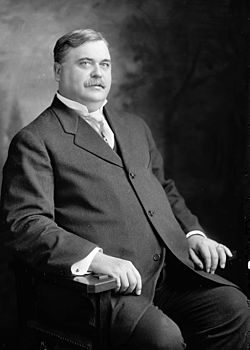Charles Edward Magoon
| Charles Edward Magoon | |
|---|---|

Charles Edward Magoon
|
|
| 2nd Provisional Governor of Cuba | |
|
In office October 13, 1906 – January 28, 1909 |
|
| Appointed by | Theodore Roosevelt |
| Preceded by | William Howard Taft |
| Succeeded by |
José Miguel Gómez as President of Cuba |
| 2nd Military Governor of Panama Canal Zone | |
|
In office 1905–1906 |
|
| Appointed by | Theodore Roosevelt |
| Preceded by | George Whitefield Davis |
| Succeeded by |
Richard Reid Rogers as Chief Engineer |
| 3rd United States Minister to Panama | |
|
In office August 7, 1905 – September 25, 1906 |
|
| Appointed by | Theodore Roosevelt |
| Preceded by | John Barrett |
| Succeeded by | Herbert G. Squiers |
| Personal details | |
| Born |
December 5, 1861 Owatonna, Minnesota |
| Died | January 14, 1920 (aged 58) Washington, D.C. |
| Resting place | Wyuka Cemetery Lincoln, Nebraska 40°49′03″N 96°39′53″W / 40.8175°N 96.6647°W |
| Occupation | Lawyer |
Charles Edward Magoon (December 5, 1861 – January 14, 1920) was an American lawyer, judge, diplomat, and administrator who is best remembered as a governor of the Panama Canal Zone, Minister to Panama, and an occupation governor of Cuba. He was also the subject of several scandals during his career.
As a legal advisor working for the United States Department of War, he drafted recommendations and reports that were used by Congress and the executive branch in governing the United States' new territories following the Spanish–American War. These reports were collected as a published book in 1902, then considered the seminal work on the subject. During his time as a governor, Magoon worked to put these recommendations into practice.
Magoon was born in Owatonna, Minnesota. His family moved with him to Nebraska when he was still a small child. In 1876, he enrolled in the "prep" program at the University of Nebraska at Lincoln and studied there for two years before officially enrolling in 1878. He left school in 1879 to study law independently with a prominent law firm. In 1882, he was admitted to the bar and practiced law in Lincoln, Nebraska. Eventually, he was made a partner in the firm. He also became the judge advocate of the Nebraska National Guard and continued to use the title of "Judge" throughout the remainder of his career.
By 1899, Magoon was sought out to join the law office of the newly created Division of Customs and Insular Affairs, later renamed the Bureau of Insular Affairs, in the U.S. Department of War under Secretary of War Russell A. Alger.
...
Wikipedia
